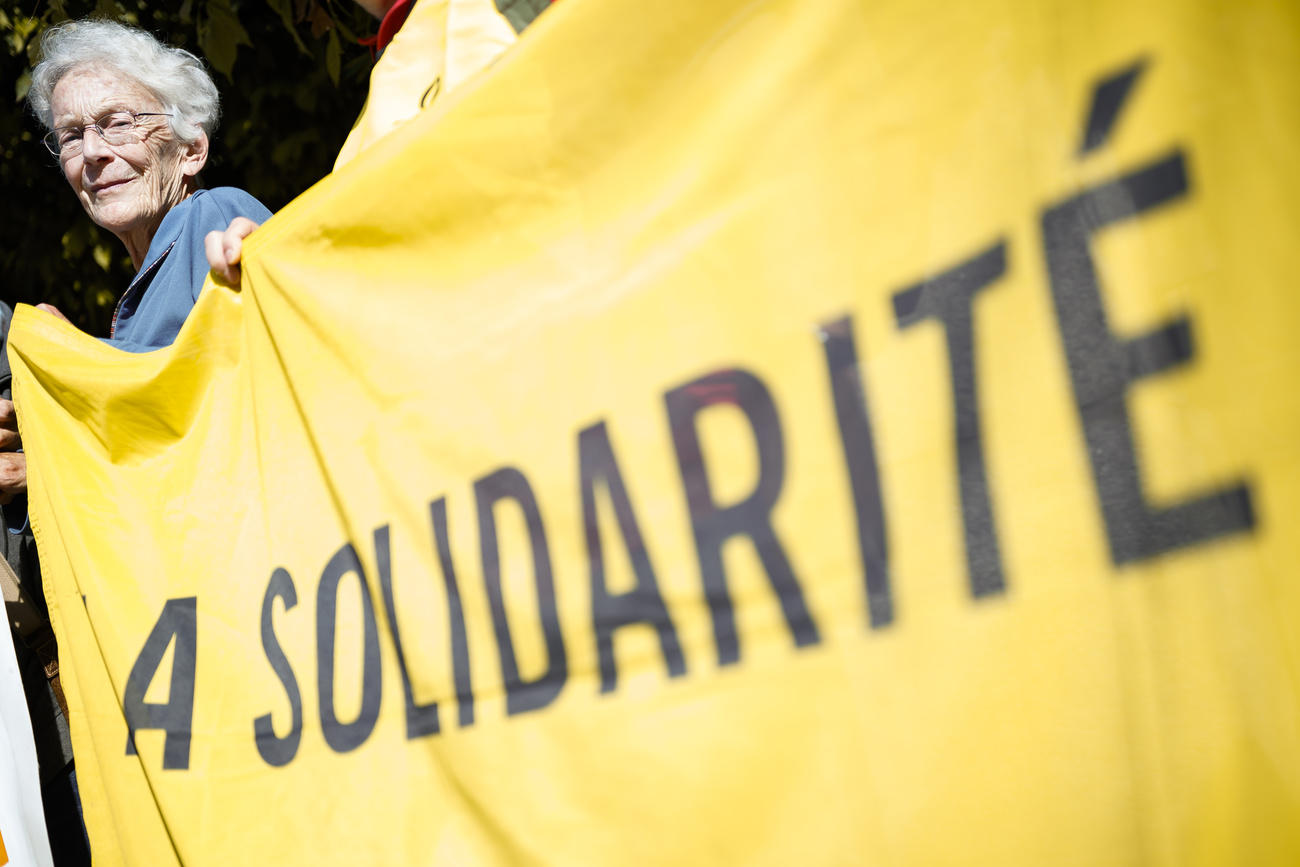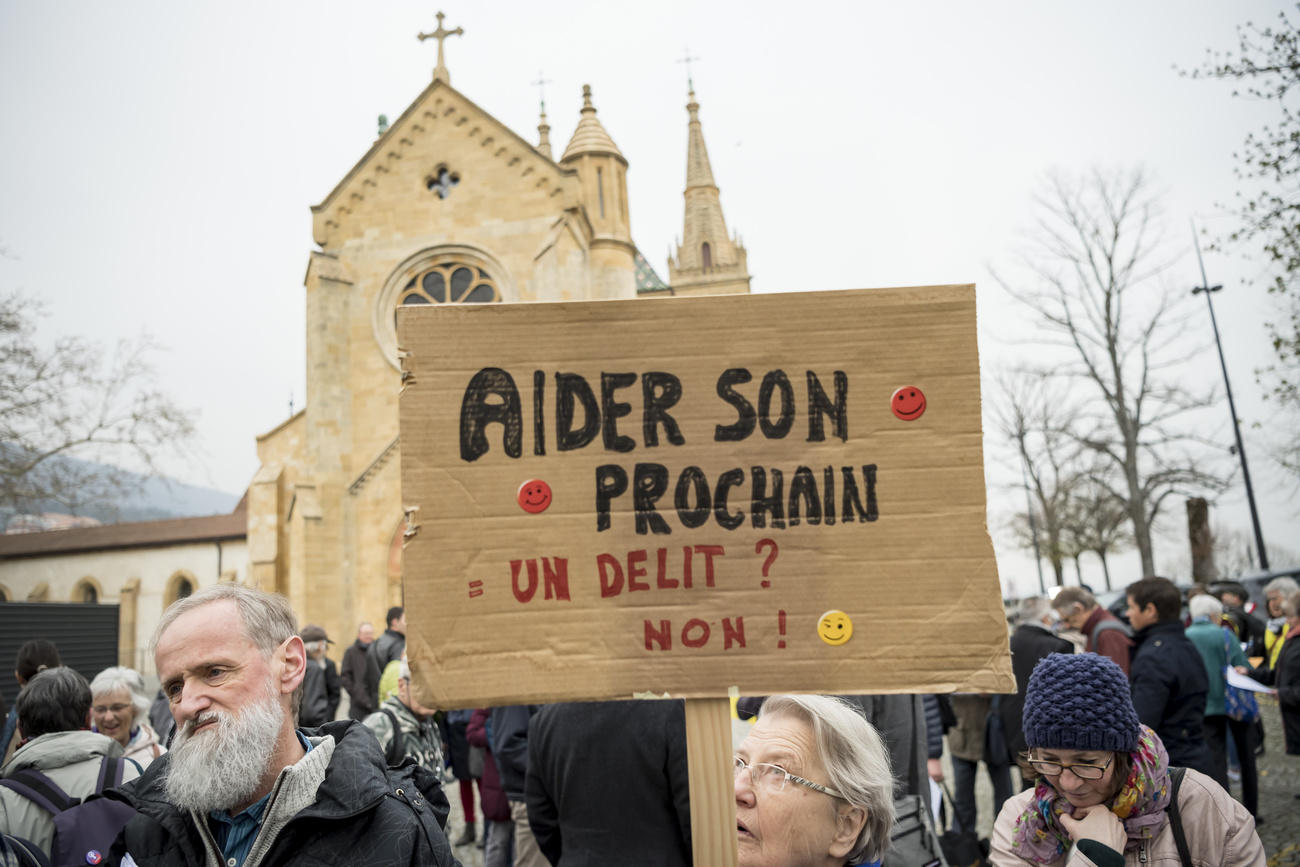
Aiding illegal immigrants remains a crime in Switzerland

People who provide help to undocumented immigrants in Switzerland risk running afoul of the law, even if they are acting purely for humanitarian reasons. Parliament has refused to introduce an exception to the law for ‘honourable motives’.
The ‘solidarity crime’ will not disappear in Switzerland. Earlier this month, the House of Representatives rejected a parliamentary initiative that sought to add an exception to Article 116 of the Foreign Nationals and Integration ActExternal link, which would have ensured that people who aid illegal migrants for ‘honourable reasons’ would not be convicted of a crime.
The proposal was defeated by 102 votes to 89, with one abstention.
“We do not differentiate between professional human traffickers and those who act for humanitarian reasons,” lamented Social Democrat Samira Marti. “We put activists and church members in the same basket as human traffickers.”
Article 116 al.1a of the law on foreigners
“Anyone who: in Switzerland or abroad, facilitates the entry, departure or illegal residence of a foreigner or participates in preparations to that end, is punishable with a custodial sentence of up to one year or a financial penalty.”
She pointed to the case of Norbert Valley, a pastor from Neuchâtel who was prosecuted for letting a rejected asylum seeker sleep in the church in the absence of other options.
Love thy neighbour
“Switzerland is a country of Christian values where we are taught to love our neighbour,” commented Katharina Prelicz-Huber of the Green Party. “We should not make criminals of those who help individuals in distress.”
The Christian Democratic Party nonetheless overwhelmingly followed the other political groups on the right, which rejected the initiative.
“Judges today have enough room to manoeuvre and can waive penalties,” explained the party’s Gerhard Pfister.
“We do not want to institute a kind of right to resistance that would undermine the law,” concluded Swiss People’s Party member Jean-Luc Addor.
Swiss intransigence
However, Switzerland comes down particularly hard on people who assist clandestine immigrants, according to a studyExternal link carried out by Amnesty International in eight European countries (Switzerland, Croatia, France, Great Britain, Greece, Spain, Italy, Malta).
In 2018, 972 people were convicted of breaching Article 116 of the Foreign Nationals Act.
The overwhelming majority of these convictions were not against human smugglers or traffickers (only 32 cases were considered to be ‘aggravated’) but were against individuals who had acted out of solidarity.
Amnesty cited the example of Anni Lanz, who was punished for having brought an asylum seeker who was ill and forced to sleep on the street from Italy to Switzerland. In another case, Valérie, who was an asylum seeker, gave an undocumented friend a place to stay, for which she was fined and received an entry on her criminal record.
Amnesty International researcher Rym Khadhraoui finds the Swiss position rigid compared to other countries. In France, for example, the law includes a humanitarian exemption for inside the country, although this does not apply to the borders.
Most vulnerable
“What shocked me is also the number of non-Swiss who are convicted when they are very vulnerable, because their residency rights are at stake,” comments Khadhraoui. “For them, it’s a double punishment.” The researcher also notes a particularity of the Swiss system, in which a final summary judgement is based only on the decision of the prosecutor, without the usual adversarial process.
“This is not very binding for the justice system, which also explains the very high number of convictions,” comments Khadhraoui. “It shows that the Swiss authorities don’t see the law as a means of combatting smugglers, but rather as a tool for migration control.”
Amnesty International supported the introduction of an exception for honourable motives in the Swiss law, but Khadhraoui notes that the question is above all a European problem that should be resolved within the framework of the Schengen-Dublin accords.
“States must stop rejecting responsibility and come to an agreement to modify the 2002 directive, to ensure that the humanitarian exemption is mandatory and non-discretionary”.
Amnesty International calls on Switzerland and other European countries to respect the United Nations protocol on the illegal trafficking of migrants, which states that individuals are only subject to punishment when they directly or indirectly receive a financial or material benefit from their action. This excludes acts of solidarity.

More
Petition seeks to decriminalise helping irregular migrants

In compliance with the JTI standards
More: SWI swissinfo.ch certified by the Journalism Trust Initiative





























You can find an overview of ongoing debates with our journalists here . Please join us!
If you want to start a conversation about a topic raised in this article or want to report factual errors, email us at english@swissinfo.ch.